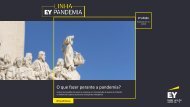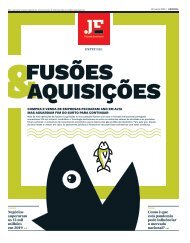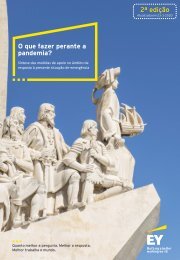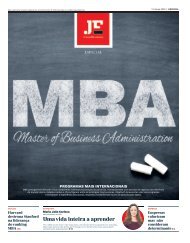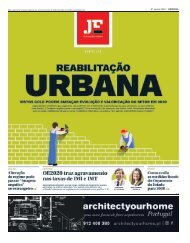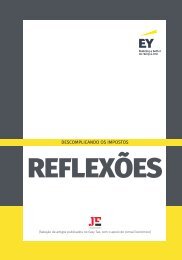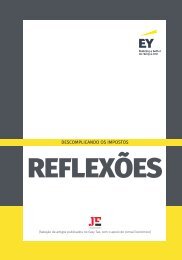MAIS TIC
You also want an ePaper? Increase the reach of your titles
YUMPU automatically turns print PDFs into web optimized ePapers that Google loves.
12 | Educação Internacional, 9 novembro 2018<br />
EDUCAÇÃO EDUCATION<br />
OPINIÃO OPINION<br />
Educação, a base<br />
do desenvolvimento<br />
EDUARDO BAPTISTA CORREIA<br />
Ativista Político, gestor e professor<br />
da Escola de Gestão do ISCTE/IUL<br />
É na educação que reside a força do<br />
desenvolvimento de uma nação.<br />
Preparar as gerações mais novas<br />
para os desafios culturais, filosóficos,<br />
sociais e económicos de uma<br />
nação é a principal garantia de sustentabilidade.<br />
Portugal apresenta<br />
níveis preocupantes nos índices de<br />
confiança nos outros e nos de corrupção.<br />
Somos uma sociedade com<br />
um conjunto de problemas não visíveis<br />
que se reflectem na capacidade<br />
de crescimento e desenvolvimento<br />
do país. A resolução desses<br />
entraves passa por preparar as gerações<br />
mais novas para práticas<br />
mais meritocráticas, para a noção<br />
do bem comum e da solidariedade.<br />
Asfamíliastêmaíumpapelimportante,<br />
mas é na escola que esses<br />
aspectos devem ser colocados em<br />
prática. Premiar a solidariedade, o<br />
mérito, a interajuda, a preservação<br />
do espaço comum, o respeito pelos<br />
mais velhos e os valores de sustentabilidade<br />
económica e ambiental,<br />
constitui o caminho para um desenvolvimento<br />
mais equilibrado e<br />
robusto.Sãoosfilhosemdeterminadasmatériasquedevemnasrespectivas<br />
famílias ajudar a garantir<br />
os comportamentos de preservação<br />
do espaço comum. Necessitamos de<br />
uma vez por todas esclarecer a<br />
enorme diferença entre formação e<br />
educação. Há tantos exemplos de<br />
pessoas muito formadas e com<br />
comportamentos ao nível da preservação<br />
do espaço comum, da meritocracia,<br />
da criatividade filosófica<br />
e dos valores da sustentabilidade<br />
social e económica marcadamente<br />
ausentes. Por isso os elevados índices<br />
de falta de confiança nos outros<br />
edecorrupçãonumasociedadeque<br />
se julga Europeia. Importa garantir<br />
que esses comportamentos são rapidamente<br />
eliminados junto das gerações<br />
mais novas. Para isso são necessários<br />
políticos interessados em<br />
alterar o modo como os programas<br />
são construídos, e professores e escolas<br />
capazes de passar aos jovens<br />
essesprincípiosqueconstituemo<br />
garantedeumasociedademaisjusta,<br />
equilibrada e democrática. Onde<br />
todos têm à partida igualdade de<br />
oportunidades. Parece-me ser esse<br />
umdosprincipaisdesafiosqueasociedade<br />
portuguesa actualmente<br />
enfrenta. Garantir que os nossos jovens<br />
serão cidadãos exemplares<br />
num mundo cada vez mais global.<br />
Esse é o princípio da rota para um<br />
Portugal grande e respeitado. Há<br />
muito para desenvolver e evoluir na<br />
democracia Portuguesa. ●<br />
Education, the basis of development<br />
It is in education that the strength of a nation’s development lays.<br />
Preparing younger generations for a nation’s cultural, philosophical,<br />
social and economic challenges is the main guarantee for sustainability.<br />
Portugal’s indexes of trust in others and of corruption are worrying. We<br />
are a society with a set of non-visible problems that are reflected in<br />
the country’s capacity for growth and development. Overcoming these<br />
obstacles starts by preparing younger generations for more meritocratic<br />
practices, for the conception of the common good and solidarity.<br />
Families play an important role here, but it is in school that these aspects<br />
must be put into practice. Rewarding solidarity, merit, mutual aid, preservation<br />
of the common space, respect for the elders and values of economic<br />
and environmental sustainability is the way towards a more balanced<br />
and robust development. The children in the respective families must<br />
help to guarantee the behaviours of the preservation of common space.<br />
We need once and for all to clarify the enormous difference between<br />
training and education. There are so many examples of highly educated<br />
individuals with behaviours in the preservation of common space, meritocracy,<br />
philosophical creativity, and social and economic sustainability<br />
values that are evidently absent. This is why there are high levels of lack<br />
of trust in others, as well as high levels of corruption in a society that<br />
considers itself European. It is important to ensure that these behaviours<br />
are quickly eliminated from the younger generations. This requires politicians<br />
who are interested in changing the way programs are built, and teachers<br />
and schools who are able to pass onto young individuals principles<br />
that are the guarantee of a more ethical, balanced and democratic<br />
society, where we all have equal opportunities. It seems to me that this is<br />
one of the main challenges that the Portuguese society is currently<br />
facing. Ensuring that our young people will be the example of what citizens<br />
should be, in an increasingly global world. This is the beginning of<br />
the route to Portugal as a great and respected country.<br />
There is so much to develop and progress in the Portuguese democracy.<br />
TESES DE DOUTORAMENTO DOCTORAL THESES<br />
Prémio Científico Mário<br />
Quartin Graça vai para…<br />
And the Mário Quartin Graça Scientific Award goes to...<br />
Fernando M. Martins, Manaíra Aires Athayde e Gil Correia venceram<br />
o Prémio Mário Quartin Graça, uma parceria entre o Banco Santander<br />
Totta em Portugal e a Casa da América Latina. Two Portuguese and one<br />
Brazilian are the winners of the 2018 edition of the Award, a partnership between<br />
Santander Totta Bank in Portugal and Casa da América Latina.<br />
Two Portuguese and one Brazilian<br />
have won the 9th edition of the<br />
scientific award that distinguishes<br />
PhDs held by Portuguese or Latin<br />
American researchers in universities<br />
through Portugal or Latin<br />
America.<br />
The Portuguese Fernando M. Martins<br />
was awarded in the category of<br />
Economic and Business Sciences.<br />
His thesis “Price and wages rigidities:<br />
macroeconomic evidence” is a dissertation<br />
on the dimension of price<br />
Dois portugueses e uma brasileira<br />
conquistaram a 9.ª edição do prémio<br />
científico que distingue doutoramentos<br />
realizadas por investigadores<br />
portugueses ou latino-<br />
-americanos em universidades de<br />
Portugal ou da América Latina.<br />
O português Fernando M. Martins<br />
distinguiu-se na categoria de<br />
Ciências Económicas e Empresariais.<br />
A sua tese Price and wages rigidities:<br />
macroeconomic evidence é<br />
uma dissertação sobre a dimensão<br />
da rigidez de preços e salários em<br />
Portugal, bem como das suas principais<br />
fontes e foi feita no ISEG.<br />
Manaíra Aires Athayde brilhou<br />
na categoria de Ciências Sociais e<br />
Humanas com a tese “Ruy Belo e o<br />
Modernismo Brasileiro. Poesia,<br />
Espólio”, realizada na Universidade<br />
de Coimbra. No seu trabalho, a<br />
investigadora brasileira mostra<br />
como determinadas características,<br />
práticas e temáticas da literatura<br />
brasileira se encontram na<br />
construção do discurso poético e<br />
crítico do poeta português.<br />
Gil Correia, também de nacionalidade<br />
portuguesa, conquistou a<br />
categoria de Tecnologias e Ciências<br />
Naturais, com o trabalho “Integração<br />
de caracterização de reservatórios<br />
com ajuste de histórico<br />
baseado em poços piloto: aplicação<br />
ao campo Norne”. A tese foi realizada<br />
na Universidade Estadual de<br />
Campinas, onde o investigador<br />
aplicou um fluxograma de modelagem<br />
geológica aplicada a um reservatório<br />
real.<br />
O brasileiro Virgílio Coelho recebeu<br />
uma menção honrosa com<br />
uma tese concluída na Universidade<br />
Federal de Minas Gerais. ● AR<br />
and wage rigidity in Portugal, as well<br />
as its main sources, and was carried<br />
outattheISEG.<br />
Manaíra Aires Athayde excelled in<br />
the category of Social and Human<br />
Sciences with the thesis “Ruy Belo<br />
and Brazilian Modernism. Poetry, Estate<br />
“, carried out at the University of<br />
Coimbra. In her work, the Brazilian researcher<br />
shows how certain characteristics,<br />
practices and themes of Brazilian<br />
literature are found in the creation<br />
of the poetic and critical narrative<br />
of the Portuguese poet Ruy Belo.<br />
Gil Correia is also Portuguese, and<br />
won the category of Technologies<br />
and Natural Sciences, with the work<br />
“Integration of reservoir characterization<br />
with historical adjustment<br />
based on pilot wells: application to<br />
the Norne field”.<br />
The jury also gave an honourable<br />
mention to Virgílio Coelho, Brazilian,<br />
with the thesis “The Ariadne Thread:<br />
Disillusion and Political Sensitivity in<br />
Os Maias, Eça de Queiroz”. ●





